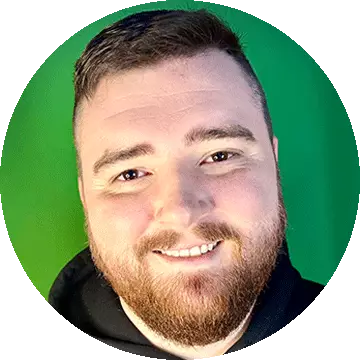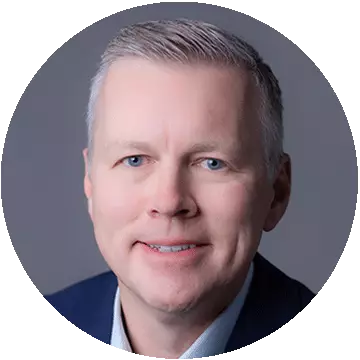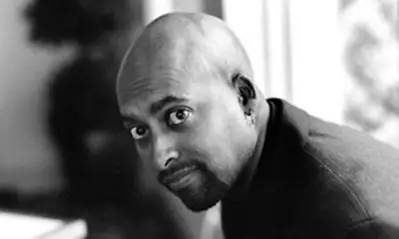Dustin Guichet breaks down problems and builds up solutions

Written by Elizabeth Exline

Time management has inspired countless books and articles (including on this very blog!). Why? Because it can spell the difference between achieving your goals and not.
Take Dustin Guichet (BSIT, 2023), for example. As an application developer for , Guichet works full time in a hybrid-remote role that has him and a team of seven others supporting thousands of users with custom software solutions. He is also pursuing his online data science master's, launching a YouTube channel and completing a book, all while supporting his family of four going on five.
How does he do everything? He schedules it.
ÔÇ£ItÔÇÖs not that you donÔÇÖt have time,ÔÇØ he says. ÔÇ£ItÔÇÖs that you need to prioritize the things that are important to you. If you want to get something done, put it on the calendar and live by your calendar.ÔÇØ
Guichet has taken this philosophy to heart. As a result, he has been able to grow his career and focus on doing what he does best: solving problems. 
Detour to data science
Guichet wasnÔÇÖt born knowing how to prioritize. In fact, he took the scenic route to the success he enjoys now at 29.
He grew up living with different siblings in different states and territories. He witnessed his brother-in-law have a massive heart attack, which inspired Guichet to consider medicine as a career. Perhaps he could suss out why such things happened, he reasoned, and prevent them from happening to others.
So, after graduating high school in Louisiana (where he currently lives), Guichet tried going to a traditional university. The party culture, however, derailed those plans, and he joined the Army National Guard instead. About this time, he embarked on a sales career, which was fun, but not as much fun as computer programming, he says. 

Dustin Guichet
BSIT, 2023; Master of Science in Data Science (in progress)
ÔÇ£I was in sales for about a decade before I wanted something more challenging,ÔÇØ Guichet explains, ÔÇ£and thatÔÇÖs when I discovered my love for programming. ÔǪ I could solve more problems designing computer solutions than I could individually with a person, so I felt like moving into software engineering would have a greater impact.ÔÇØ┬á
This notion of solving problems is important to Guichet, who has been known to open his home to those in need after a hurricane and who devoted upward of 30 hours a week volunteering to help kids learn robotics.
Back then, however, he didnÔÇÖt have the time or money to invest in a college degree. Instead, he had a growing family who depended on him. He started to research his options, the same way heÔÇÖd researched how-to videos on programming, which helped him build video games but left him in what he calls ÔÇ£tutorial hellÔÇØ: He could build a program in a paint-by-numbers way, but he couldnÔÇÖt innovate from the ground up. He needed knowledge in a conceptual, fundamental way, and he found it in a software-development boot camp that is now known as .
The program Guichet signed on to involved three months of education followed by a six- to 12-month apprenticeship.
Guichet, who is the sole provider for his family, stopped working and focused on learning. He took in some contract work on the side to make ends meet, and he kept his eye on the prize of a career change.
ÔÇ£They were long, long days,ÔÇØ he says. ÔÇ£They were 16-hour days.ÔÇØ The payoff was more than just a placement at a company where he could (and did) acquire employment. It also provided him with knowledge that, in some ways, left him hungry for more.
Investing in himself and his future
ÔÇ£I never wanted to pigeonhole myself into someone else telling me how much I need to make, so I decided to get a college degree for reputation and refutability,ÔÇØ Guichet says.
░«╬█┤½├¢ cleared the path for him to achieve this. GuichetÔÇÖs apprenticeship and military experience translated to college credits at UOPX, enabling him to earn his Bachelor of Science in Information Technology with a software development specialization in less than a year.
It wasnÔÇÖt easy. Guichet had to learn how to own his educational process rather than rely on an instructor or anyone else to tell him what he needed to do. That, he says, made him stronger both in the classroom and on the job.
It also seems to have stuck. HeÔÇÖs currently using tuition reimbursement from his employer to pursue his Master of Science in Data Science. ┬á
ÔÇ£Once upon a time, I believed that I didnÔÇÖt necessarily need a degree, and I would attribute a lot of my success to ░«╬█┤½├¢ specifically because of the things that it taught me,ÔÇØ Guichet says. ÔÇ£I would also say that itÔÇÖs not the perfect system, but nothing is perfect, and it is what you make of it. ÔǪ I mean, at the end of the day, the quality is up to you.ÔÇØ
In GuichetÔÇÖs case, heÔÇÖs committed to making the most of every class, every opportunity. In 2022, he joined ISC for the opportunity to build apps and software from the ground up. ÔÇ£ItÔÇÖs not your standard 9-to-5 job,ÔÇØ he says. ThatÔÇÖs a good thing. He loves meeting with stakeholders, researching their problems and then building solutions.
ÔÇ£ItÔÇÖs a matter of perseverance and looking at problems from different angles,ÔÇØ Guichet says. ÔÇ£That unknown is the excitement. ItÔÇÖs like, ÔÇÿWell, what am I going to face tomorrow?ÔÇÖÔÇØ
GuichetÔÇÖs mentor, Jim Andrews, can vouch for GuichetÔÇÖs enthusiasm. Andrews is the executive director for S&P Dow Jones Indices, and he has learned to identify certain predictors of success.┬á

Jim Andrews
Executive Director for S&P Dow Jones Indices
ÔÇ£In my 25+ years of experience in the industry, I have witnessed a positive attitude and passion toward oneÔÇÖs work to be two of the biggest drivers of success,ÔÇØ Andrews says. ÔÇ£Regardless of the challenges he has faced, Dustin approaches each task with enthusiasm and optimism. IÔÇÖm sure this positive mindset boosts his own productivity.ÔÇØ
If Andrews is right, Guichet is poised for success not just at work but with his side projects. And there are several significant side projects. In addition to writing a book, Keep It Simple: Own Your Mistakes, Guichet has started a company called Razor Concept that seeks to find or build solutions to complex problems.
He likens this to the how-do-you-eat-an-elephant clich├®. Solving problems usually means breaking them down into smaller challenges. As he says, ÔÇ£DonÔÇÖt overcomplicate it. If you canÔÇÖt explain it to a 5-year-old, then you donÔÇÖt know it well enough to even talk about it.ÔÇØ
In GuichetÔÇÖs case, simple solutions ÔÇö whether to time management or stakeholder challenges ÔÇö have formed a pathway to success.
Find out if your employer is one of the more than 1,500 organizations ░«╬█┤½├¢ works with to offer education benefits.
Meet ░«╬█┤½├¢es like Dustin. Make connections, build relationships and be part of a growing community. Join a chapter.

ABOUT THE AUTHOR
Elizabeth Exline has been telling stories ever since she won a writing contest in third grade. She's covered design and architecture, travel, lifestyle content and a host of other topics for national, regional, local and brand publications. Additionally, she's worked in content development for Marriott International and manuscript development for a variety of authors.
This article has been vetted by ░«╬█┤½├¢'s editorial advisory committee.┬á
Read more about our editorial process.
Read more articles like this:


